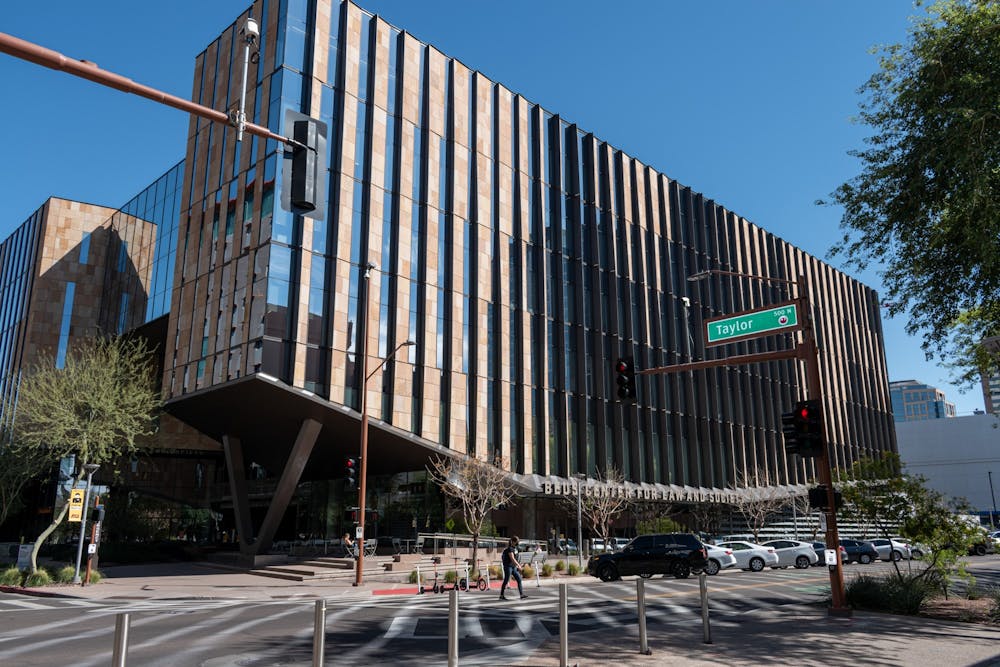Two high-achieving Native American students were named the Sandra Day O'Connor College of Law's first Salt River Scholars, a new program offered by ASU's Indian Legal Program.
First-year ASU Law students Ashleigh Fixico and Noah Goldenberg were chosen for the award. Recipients receive a full-tuition scholarship, a paid research assistant position and additional mentorship and financial support as they gain legal experience while studying.
The scholarship was made possible through a partnership between ASU and the Salt River Pima-Maricopa Indian Community, said Kate Rosier, executive director of the Indian Legal Program.
Officially partnering with the Salt River Pima-Maricopa Indian Community in 2007, Rosier thought the scholarship would be a perfect "thank you" on behalf of the University for its continued support.
"We thought that naming the scholarship program after them was a great way to honor that partnership," Rosier said.
Goldenberg, a descendent of the Lower Sioux Indian Community, said he felt "taken aback and very humbled by the experience."
Raised in Portland, Oregon, Goldenberg received degrees in religious studies and history from the University of British Columbia before moving with his wife back to the U.S.
Goldenberg knew he wanted to pursue Indian law after participating in the Native American Pipeline to Law Initiative in 2019, a workshop that teaches Native American students about the process of applying to law school, from LSAT preparation to writing letters of recommendation and more.
A member of the Mvskoke Tribe in Seminole, Fixico said receiving the scholarship was an honor not only for her as an individual, but for other Native American students like her.
"It's really humbling that I'm also a representative for my people through this scholarship, but also knowing that I'm kind of a role model for my people too, it's a very daunting and humbling experience," Fixico said.
An Oklahoma native and Dartmouth graduate with degrees in government and Native American studies modified with Hispanic studies, Fixico said she knew she wanted to specialize in Indian law since she was a child.
Picking up storybooks and autobiographies about Native American people since being as young as 8 years old fueled her passion to give back to her community.
She has interned with the U.S. Department of Justice Office on Violence Against Women and the Udall Native American Congressional Internship Program. Her identity as a half-Black and Native American woman is crucial to her work, she said.
"The laws are really shaped by the people who are advocating the law," Fixico said.
"When there's less diversity in the legal profession, that trickles down to meaning that there's less voice and representation of issues that acutely affect minority communities," Goldenberg said.
Goldenberg, a descendant of both Jewish and Native American parents, remembers sitting down with his mother one day for what he described as the "most important conversation about my identity of my life."
"She said: 'You have the honor and the privilege and the burden of being from two historically very oppressed groups that, in theory, should no longer exist, and only exist through sheer force of will to continue,'" Goldenberg said.
Established more than 30 years ago, the Indian Law Program at ASU continues its work to boost Native American representation in law. Students work with tribal courts code drafting, organizing trainings aimed at understanding the law and starting youth programs
With more than 27% of Arizona's land being tribally owned, Rosier emphasized the importance of the program and work.
"The tribes do so much for their local communities, and they are neighbors. I think that bringing attention to how much good they do is really important," Rosier said. "Because I feel like a lot of people who live in Arizona don't know all the tribes, or don't know much about them at all. So if we can help people better understand those and support the tribes, I consider that a win."
She said over the years, ASU has worked with the National Native American Bar Association, the Indigenous Law Program at Michigan State University's College of Law, UC Berkeley Law and the American Indian Law Center, Inc. and more.
"We want to empower these students to be great attorneys in whatever field they want to pursue, because we need great lawyers," Rosier said. "And for future students, I hope this encourages them to apply to ASU and come be part of our little family here."
Reach the reporter at sreyes23@asu.edu and follow @r_salma_ on Twitter.
Like The State Press on Facebook and follow @statepress on Twitter.
Continue supporting student journalism and donate to The State Press today.




